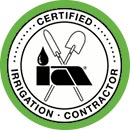What is a Certified Landscape Irrigation Auditor (CLIA) and why is it important?
 Irrigation Association certification program is designed especially for irrigation professionals to demonstrate their experience and technical competence to the industry and to customers. Certification elevates your ability to land a job, make knowledgeable field decisions and provide customers with confidence in your abilities. Choose from six nationally recognized certifications in agriculture, turf/landscape and golf irrigation.
Irrigation Association certification program is designed especially for irrigation professionals to demonstrate their experience and technical competence to the industry and to customers. Certification elevates your ability to land a job, make knowledgeable field decisions and provide customers with confidence in your abilities. Choose from six nationally recognized certifications in agriculture, turf/landscape and golf irrigation.
Anyone who intends to provide professional services in any aspect of irrigation… consultants, designers, architects, contractors and technicians… should get certified in one or more Irrigation Association certification programs.
Experience and education are the cornerstones to effective water management. In an effort to standardize and improve the level of knowledge and proficiency industry-wide, the Irrigation Association introduced certification in 1983. The program continues to be expanded and updated, especially in light of increased demand on water resources and the growing focus on water conservation in communities everywhere.
Jeremy received his CLIA certification in 2006 and is one of only 3 Certified Landscape Irrigation Auditors in Lincoln. Jeremy attended his classes and tested for his certification in Carey, NC. As Jeremy was willing to make travel to North Carolina for this certification it is a testament to both his involvement and dedication to professionalism and water conservation in the irrigation industry.
Irrigation Association certification as a Landscape Irrigation Auditor indicates that the successful applicant has:
- Passed a written exam covering the principles and practices of auditing.
- Agreed to follow a specific Code of Ethics established by the Irrigation Association Certification Board.
- Submitted an independently completed audit verified by an IA certified auditor in good standing
These individuals are involved in gathering irrigation water-use data and testing landscape irrigation systems. Auditors compile water records, perform water-use studies, measure irrigated sites, identify plant materials by general groups, determine irrigation water requirements, estimate potential dollar and water savings, plus rank sites by net benefits.
Landscape Irrigation Auditor Responsibilities
Certified Landscape Irrigation Auditors develop system testing strategies, check pressure and flow rates, and conduct water application distribution tests. They collect data to determine irrigation uniformity and efficiency. They take soil samples and determine soil types and root zone depths.
Certified Landscape Irrigation Auditors observe system operations, locate irrigation zones, prepare site audit maps and visually identify broken or misaligned equipment. They can also summarize data from field tests and may use this information to generate monthly irrigation base schedules. They may provide this information to Certified Landscape Irrigation Managers or Certified Irrigation Designers to make recommendations for changes.
Eligibility and Application
Certification as a Landscape Irrigation Auditor (CLIA) is a three-step process.
Step 1 – Program Application and Exam Registration
- To apply to the IA Certified Landscape Irrigation Auditor program, you must meet the requirement of at least one year of verifiable irrigation-related work experience.
- After your application has been received and verified, you will receive a letter informing you of your status in the program.
- Pre-registration is required at least 30 days prior to exam date. On-site registration is not allowed. Registration for a class does not register you for an exam.
Step 2 – Examination
- To become certified you must pass a certification examination administered by the IA and agree to operate by the IA Code of Ethics.
- A candidate will be allowed to take the exam no more than three times within a two-year period. If unsuccessful on the third attempt, the candidate must wait two years before they will be allowed to re-apply to the program and take the examination.
Step 3 – Your Audit Submission
- Before certification will be awarded, candidates must submit an independently completed audit verified by an Irrigation Association Auditor (CLIA or CGIA) in good standing, within one (1) year of acceptance to the certification program.
Without exception, landscape audits MUST be submitted on the 14 IA-specified worksheets and include rotor and spray zones. The base schedule worksheet from the software program is also acceptable. - All requirements – exam and audit – must be submitted within one (1) year of acceptance to the certification program.
Exam Description
The examination is a 3 hour (maximum), closed book exam with 80 equally-weighted, multiple choice questions. The content areas with approximate percentages are:
25% Irrigation audit procedures/technology
19% Base schedules/scheduling
12% Terminology
12% Soils
10% Irrigation
6% Weather
6% Plants
4% Site selection
3% Water use
3% Schedule adjustments
Landscape Irrigation Auditor
The Irrigation Association offers an optional 1-1/2 day course entitled Landscape Irrigation Auditor.
- 11 IA CEUs
- Learn how to perform field tests on irrigation systems to determine efficiency, plus how to calculate accurate watering schedules for irrigation systems by combining plant water use, soils and local weather data.
- Deals directly with the issue of wise water management.
- Recommended prerequisites: basic understanding of sprinkler system operation. Irrigation System Installation and Field Hydraulics are suggested prep courses.
- Basic math skills required.
- Course includes 1-1/2 days of instruction and the course manual. Optional software available